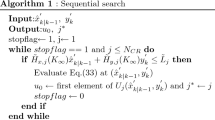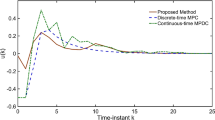Abstract
On-line model predictive control approaches require the online solution of an optimization problem. In contrast, the explicit model predictive control moves major part of computation offline. Therefore, eMPC enables one to implement a MPC in real time for wide range of fast systems. The eMPC approach requires the exact system model and results a piecewise affine control law defined on a polyhedral partition in the state space. As an important limitation, disturbances may reduce performance of the explicit model predictive control. This paper presents efficient approach for handling the problem of using eMPC for constrained systems with disturbances. It proposes an approach to improve performance of the closed loop system by designing a suitable state and disturbance estimator. Conditions for observability of the disturbances are considered and it is depicted that applying the disturbance’s estimation leads to rejection of the response error. It is also shown that the proposed approach prevents the reduction of feasible space. Simulation results illustrate the advantages of this approach.
Similar content being viewed by others
References
E. F. Camacho and C. Bordons, Model Predictive Control, 2nd edition, Springer, 1999.
B.-C. Ding, Modern Predictive Control, Taylor and Francis Group, CRC Press INC, 2009.
A. Bemporad and M. Morari, “Robust model predictive control: a survey,” Robustness in identification and control, Lecture Notes in Control and Information Sciences, vol. 245, pp. 207–226, 1999.
J. M. Maciejowski, Predictive Control with Constraints, Pearson Education Limited, Prentice Hall, London, 2002.
M. V. Kothare, V. Balakrishnan, and M. Morari, “Robust constrained model predictive control using linear matrix inequalities,” Automatica, vol. 32, no. 10, pp. 1361–1379, 1996.
Z. Wan and M. Kothare, “An efficient off-line formulation of robust model predictive control using linear matrix inequalities,” Automatica, vol. 39, pp. 837–846, 2003.
A. Bemporad, M. Morari, V. Dua, and E. Pistikopoulos, “The explicit linear quadratic regulator for constrained systems,” Automatica, vol. 38, no. 1, pp. 3–20, 2002.
P. Tøndel, T. A. Johansen, and A. Bemporad, “An algorithm for multi-parametric quadratic programming and explicit MPC solutions,” Automatica, vol. 39, pp. 743–749, 2003.
F. Bayat and T. A. Johansen, “Multi-resolution explicit model predictive control: delta-model formulation and approximation,” IEEE Trans. on Automatic Control, vol. 58, no. 11, pp. 2979–2984, 2013.
A. Bemporad and C. Filippi, “An algorithm for approximate multi-parametric convex programming,” Computation Optimization Application, vol. 35, pp. 87–108, 2006.
F. Bayat, T. A. Johansen, and A. A. Jalali, “Flexible piecewise function evaluation methods based on truncated binary search trees and lattice representation in explicit MPC,” IEEE Trans. on Control Systems Technology, vol. 20, no. 3, pp. 632–640, May 2012.
F. Bayat, T. A. Johansen, and A. A. Jalali, “Using hash tables to manage the time-storage predictive control,” Automatica, vol. 47, no. 3, pp. 571–577, 2011.
M. Baotic, F. Borrelli, A. Bemporad, and M. Morari, “Efficient on-line computation of constrained optimal control,” SIAM Journal on Control and Optimization, vol. 47, no. 5, pp. 2470–2489, 2008.
F. Christophersen, M. Kvasnica, C. N. Jones, and M. Morari, “Efficient evaluation of piecewise control laws defined over a large number of polyhedra,” Proc. of European Control Conference, pp. 2360–2367, 2007.
E. N. Pistikopoulos, “Perspectives in multiparametric programming and explicit model predictive control,” American Institute of Chemical Engineers Journal, vol. 55, no. 8, pp. 1918–1925, 2009.
D. Chu, T. Chen, and H. J. Marquez, “Explicit robust model predictive control using recursive closed-loop prediction,” Int. J. Robust Nonlinear Control, vol. 16, pp. 519–546, 2006.
D. Muñoz de la Peña, A. Bemporad, and C. Filippi, “Robust explicit MPC based on approximate multiparametric convex programming,” IEEE Trans. on Automatic Control, vol. 51, no. 8, pp. 1399–1403, 2007.
A. Grancharova and T. A. Johansen, “Design of robust explicit model predictive controller via orthogonal search tree partitioning,” Proc. of European control Conference, Cambridge, UK, 2003.
T. Besselmann, J. Lofberg, and M. Morari, “Explicit model predictive control for systems with linear parameter-varying state transition matrix,” Proc. of the 17th World Congress, The International Federation of Automatic Control Seoul, Korea, July 6–11, 2008.
T. A. Badgwell and K. R. Muske, “Disturbance model design for linear model predictive control,” Proc. of the American Control Conference, vol. 2, pp. 1621–1626, 2002.
U. Maeder, F. Borrelli, and M. Morari, “Linear offset-free model predictive control,” Automatica, vol. 45, no. 10, pp. 2214–2222, 2009.
U. Maeder and M. Morari, “Offset-free reference tracking with model predictive control,” Automatica, vol. 46, pp. 1469–1476, 2010.
J. B. Rawlings and K. R. Muske, “The stability of constrained receding-horizon control,” IEEE Trans. on Automatic Control, vol. 38, pp. 1512–1516, 1993.
E. C. Kerrigan and J. M Maciejowski, “Invariant sets for constrained nonlinear discrete-time systems with application to feasibility in model predictive control,” Proc. of the 39th IEEE Conference on Decision and Control, 2000.
S. S. Keerthi and E. G. Gilbert, “Optimal, infinite horizon feedback laws for a general class of constrained discrete time systems: Stability and moving-horizon approximations,” Journal of Optimization Theory and Application, vol. 57, pp. 265–293, 1988.
Author information
Authors and Affiliations
Corresponding author
Additional information
Recommended by Associate Editor Izumi Masubuchi under the direction of Editor PooGyeon Park.
Mohammad Ali Mohammadkhani received his Master degree in Mechatronics engineering from K.N. Toosi University of Technology in 2010. He is currently working towards a Ph.D. degree at the Iran University of Science and Technology. His research interests include applying robust explicit Model Predictive control, reference tracking for state-feedback controllers, model predictive control, and aerospace applications of control.
Farhad Bayat was born in 1981 in Zanjan, Iran. He is an assistant professor at the Department of Engineering at the Zanjan University, Zanjan, Iran. He received his M.Sc. degree in 2006 and Ph.D. degree in 2011, both in Electrical Engineering from the Iran University of Science and Technology, Tehran, Iran. Since 2008 he is serving as a lecturer in the Department of Engineering, University of Zanjan where he has been appointed as an assistant professor in 2011. He has been a research visitor at the Department of Engineering Cybernetics at the Norwegian University of Science and Technology, Trondheim, Norway, in 2010. He is a member of the IEEE community and he has served as a review for several international journals, e.g., Automatica, Control Engineering Practice and IEEE Transactions on Circuits and Systems. His research interests include model predictive control, multi-parametric programming, optimization based control, and aerospace applications of control.
Ali Akbar Jalali received his M.Sc. in Electrical Engineering from the University of Oklahoma, USA, in 1988. He sequentially earned his Ph.D. and post doctoral in Electrical Engineering, from West Virginia University in 1993 and 1994, respectively. From 1993 to 1994 he has been a visiting assistance professor in West Virginia University. He is an adjunct professor in LCSEE from April 2002 and at the same time he is an associate professor at the Iran University of Science and Technology. He is a member of the IEEE and Iranian Society of Instrument & Control Engineering (ISCI). His research interests include robust control and Hinf filtering theory and design, optimal control, and optimization.
Rights and permissions
About this article
Cite this article
Mohammadkhani, M.A., Bayat, F. & Jalali, A.A. Design of explicit model predictive control for constrained linear systems with disturbances. Int. J. Control Autom. Syst. 12, 294–301 (2014). https://doi.org/10.1007/s12555-013-0058-0
Received:
Revised:
Accepted:
Published:
Issue Date:
DOI: https://doi.org/10.1007/s12555-013-0058-0




